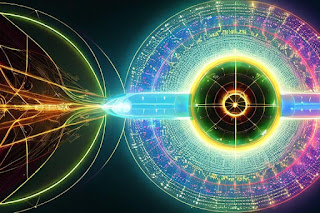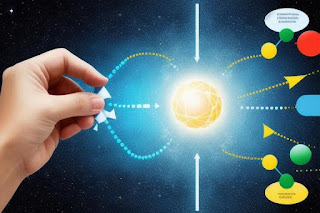Everyone wants to make decisions on what is best for one's life. The desire and ability to think independently, imagine, work, and see fruition in the choices we make takes us to the so called free will.
Free will is the philosophical concept that individuals can make choices and decisions based on their desires and preferences, without being predetermined by external factors.
Subjective experience of freedom on sentiments of guilt on revealed religion and on common assumption of individual moral responsibility that underlies the concepts of law, reward, punishment, and incentive.
Free Will with Laws of Physics
Free Will affects human behavior. Free will in human behavior and physics is even fascinating! A human as a quantum system has both choice and a goal, this means a human has free will. An electron, on the other hand as a quantum system has always a choice but not free will, because it doesn't have a goal.
The concept of free will and the laws of physics may seem contradictory at first glance. It is possible to argue that free will can still coexist within the framework of the laws of physics. One way to reconcile these ideas is by considering that while the laws of physics govern the physical world, they do not necessarily govern human consciousness or decision-making processes.
Human beings possess complex cognitive abilities, including reasoning, logic, and self-awareness, which are not fully explained by the laws of physics. These higher mental processes may operate outside the realm of deterministic causation, allowing for the exercise of free will.
Furthermore, quantum mechanics, a branch of physics that deals with the behavior of particles at the subatomic level, introduces an element of unpredictability.
Quantum indeterminacy suggests that certain events at the atomic and subatomic levels occur randomly and cannot be fully determined by the laws of physics. Some argue that this randomness provides room for free will to exist, as it introduces an element of uncertainty that may influence decision-making processes.
Another perspective is that free will and determinism can coexist if we consider that our choices are influenced by a combination of external factors and internal desires. While we may not have complete control over the external circumstances we encounter, we still can choose or reject certain courses of action based on our preferences and values.
This viewpoint suggests that free will is not necessarily about complete autonomy but rather about the capacity to make choices within the constraints of the physical world.
Free Will with Imagination
The relationship between free will and imagination is an intriguing one. Imagination plays a crucial role in shaping and influencing our choices and decisions. It allows us to explore various possibilities, scenarios, and outcomes in our minds before taking action.
Imagination enables us to envision different options and consider their potential consequences, thereby giving us the freedom to make informed choices. Furthermore, imagination can also help us break free from the constraints of our immediate circumstances and envision a different reality.
It enables us to think beyond the limitations imposed by external factors and societal expectations, opening up a realm of possibilities and alternative paths.
Additionally, imagination also plays a significant role in the development and expression of our beliefs, values, and desires. It allows us to imagine and aspire to a better future, motivating us to take steps toward achieving our goals and dreams.
However, despite the influence of imagination on our choices, it is crucial to recognize that free will goes beyond mere imagination. Free will involves not only the ability to imagine various options but also the capacity to consciously and autonomously select and act upon them. It involves the responsibility for the choices we make and the consequences that follow.
While imagination can enhance our free will by expanding our possibilities and influencing our decisions, it does not determine our choices entirely. Ultimately, free will encompasses a combination of imagination, rationality, desires, values, experiences, and volition, among other factors.
Free Will Neural Science
Free will is a concept that has been debated by philosophers and scientists for centuries. Reflections on free will has taken a new phase, from explaining freedom away to new ways of operationalizing and measuring it. Leading to increasing interest in exploring the relationship between free will and neural science.
Neural science, on the other hand, is the study of the brain and its functions. It involves understanding how neural circuits and networks process information and generate behavior.
The concept of free will is hard to define, but crucial to both individual and social life. For centuries people have wondered how freedom is possible in a world ruled by physical determinism.
The question arises: Is free will simply an illusion, with our actions determined by the neural activity in our brains? Or do we truly have the power to make choices and decisions that are independent of our neural processes?
Some researchers argue that the findings of neural science support the idea that free will is an illusion. They point to experiments that show how neural activity in the brain can predict actions several seconds before a person becomes aware of making a decision.
This suggests that our brains may be making choices before we even consciously realize it. Others, however, maintain that free will and neural processes are not mutually exclusive. They argue that while our brains may play a role in influencing our choices, we still can make conscious decisions.
They propose that free will involves a complex interplay between biology, psychology, and external factors. Ultimately, the debate surrounding free will and neural science is far from settled.
The nature of consciousness and decision-making is still not fully understood. Further research and exploration in the field of neural science will likely continue to shed light on this complex and fascinating topic.
The Power Of Free Will
The power of free will is a fundamental aspect of human existence, and it plays a vital role in shaping our lives. One of the key elements of free will is the ability to choose between different options.
Every day, we are faced with numerous decisions, both big and small. From choosing what to wear to deciding on a career path, our choices shape the course of our lives.
- Free will allows us to determine our path and create our destiny.
- Free will also empower us to take responsibility for our actions. When we make a choice, we understand that the consequences of that decision are ours to bear. This sense of accountability helps to foster personal growth and development. By being aware of the impact our choices have on ourselves and others, we can strive to make informed and ethical decisions.
- Furthermore, free will is essential for personal autonomy and self-expression. It allows us to live according to our values, beliefs, and desires. Without free will, we would be merely passive recipients of external influences, unable to express our individuality or pursue our sense of purpose.
- Free will gives us the freedom to be true to ourselves and live a fulfilling life. However, the power of free will also comes with its challenges and dilemmas. The choices we make are often influenced by a multitude of factors, including societal norms, personal biases, and subconscious motivations. These influences can sometimes cloud our judgment and lead to less-than-optimal decisions.
- Moreover, the power of free will also means that we bear the responsibility for the consequences of our actions, both positive and negative. It requires us to reflect and learn from our mistakes, to make amends when necessary, and to strive for personal growth.
Free will has its foundation in the human cognition and the potential influence of quantum indeterminacy. Moreover, free will extends beyond imagination and involves the conscious and autonomous decision-making capacity of individuals.
The power of free will is a fundamental aspect of human existence. It is through the exercise of free will that we can truly shape our own lives and find fulfillment and purpose.






Thank you for reading!